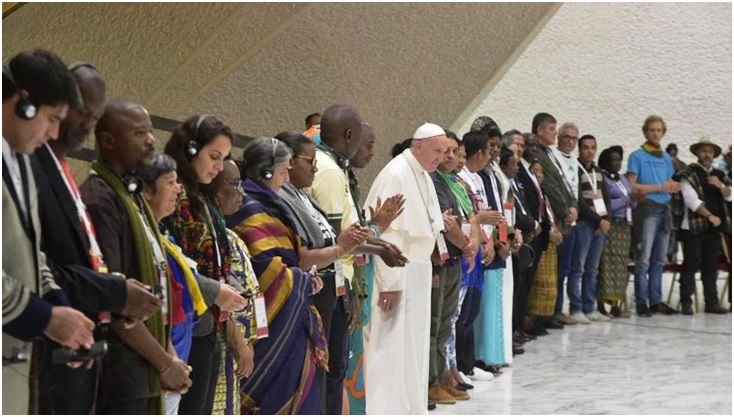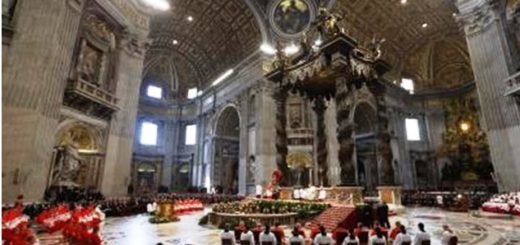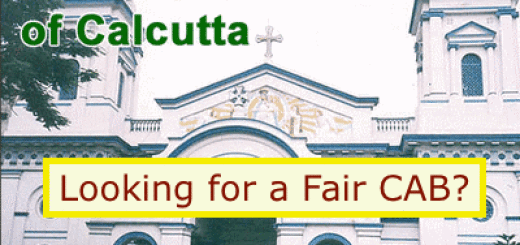Pope denounces God of money “No people is criminal no religion is terrorist”

By DOMENICO AGASSO JR, in Vatican Insider, 17/02/2017
Pope Francis in his message to the Popular movements gathered in California: there is no Christian, Jewish or Muslim terrorism. Ignoring the poor is “moral blindness”
Cover Photo: Pope Francis’ audience with the world Popular Movements (November 5, 2016)
(Note: Worshiping God of Money makes capitalist systems blind to the plight of  the poor which is to be denounced, says Francis. What is needed is to become a Good Samaritan to the needy. For that one should have compassion in one’s heart. Economic systems focused on profit can’t have that. What is needed is to build bridges of humane humanity to overcome racist walls of separation.
the poor which is to be denounced, says Francis. What is needed is to become a Good Samaritan to the needy. For that one should have compassion in one’s heart. Economic systems focused on profit can’t have that. What is needed is to build bridges of humane humanity to overcome racist walls of separation.
For that what he prescribes is the prayer of St. Francis: “Where there is hatred, let us sow love; where there is injury, let us sow pardon; where there is discord, let us sow unity; where there is error, let us sow truth.” Human beings are the same everywhere. They don’t become good or bad just because they belong to a special country, religion or group. Surroundings and company one keeps help one to acquire good or bad habits. Hence the saying: “Tell me who your friends are and I will tell you who you are.” But it is in the power of all to resist all inhuman tendencies and cultivate compassion towards the lowly placed which is the beginning of cultivating a culture of humane humanity. james kottoor, editor).
VATICAN CITY: Ignoring the poor is “moral blindness”. There is no Christian, Jewish or Muslim terrorism. No people is terrorist. Pope Francis does not mince words in his message to the Popular movements, gathered in these days (February 16 to 19) in Modesto, California, to denounce the economic system that has the god of money at its center and the prejudice on the alleged innate and widespread fundamentalism of certain nations or religions.
In particular, the Pontiff pointed the finger at the “fashionable style one looks at those who suffer without touching them. But they are televised live; they are talked about in euphemisms and with apparent tolerance, but nothing is done systematically to heal the social wounds or to confront the structures that leave so many brothers and sisters by the wayside.
The Bishop of Rome denounces, “Sooner or later, the moral blindness of this indifference comes to light, like when a mirage dissipates”. Pope Bergoglio warns: “The system’s gangrene cannot be whitewashed forever because sooner or later the stench becomes too strong; and when it can no longer be denied, the same power that spawned this state of affairs sets about manipulating fear, insecurity, quarrels, and even people’s justified indignation, in order to shift the responsibility for all these ills onto a “non-neighbor”. And this, the Pope said, is the greatest temptation that feeds a “social and political process that flourishes in many parts of the world and poses a grave danger for humanity.”
Then, on fundamentalist violence around the world, he states: “Christian terrorism does not exist, Jewish terrorism does not exist and Islamic terrorism does not exist. They do not exist. No nation is criminal, and no religion is terrorist. No people is criminal or drug-trafficking or violent.“ The Pope noted, “There are fundamentalist and violent individuals in all peoples and religions—and with intolerant generalizations they become stronger because they feed on hate and xenophobia.”
The Pontiff then reflected on environmental issues: “The ecological crisis is real – he reiterates – the economic system that has the god of money at its center, and that sometimes acts with the brutality of the robbers in the parable, inflicts injuries that to a criminal degree have remained neglected.
The Pontiff continues: “The unemployment is real, the violence is real, the corruption is real, the identity crisis is real, the gutting of democracies is real” and after this list he points out: Jesus teaches us a different path. Do not classify others in order to see who is a neighbor and who is not. You can become neighbor to whomever you meet in need, and you will do so if you have compassion in your heart. That is to say, if you have that capacity to suffer with someone else. You must become a Samaritan” because “here are the roots of the authentic humanity that resists the dehumanization that wears the livery of indifference, hypocrisy, or intolerance.”
Targeting in particular Christians, Francis launches an exhortation: “We should be neither paralyzed by fear nor shackled within the conflict. We have to acknowledge the danger but also the opportunity that every crisis brings in order to advance to a successful synthesis. “According to the Pope, “The grave danger is to disown our neighbors. When we do so, we deny their humanity and our own humanity without realizing it; we deny ourselves, and we deny the most important Commandments of Jesus. Herein lies the danger, the dehumanization”
Today “dehumanizing processes are accelerated,” but Francis assures, “here we also find an opportunity: that the light of the love of neighbor may illuminate the Earth with its stunning brightness like a lightning bolt in the dark.”
Thus, “By confronting terror with love, we work for peace. I ask you for meekness and resolve to defend these principles – writes Francis his message – I ask you not to barter them lightly or apply them superficially. Like Saint Francis of Assisi, let us give everything of ourselves: where there is hatred, let us sow love; where there is injury, let us sow pardon; where there is discord, let us sow unity; where there is error, let us sow truth.”
Another papal invitation to fight for social justice by “building bridges between peoples and individuals. These are bridges that can overcome the walls of exclusion, indifference, racism, and intolerance.” Francis wishes “through this letter, to encourage and strengthen each one of you, your organizations, and all who strive with you for “Land, Work and Housing “hoping “such constructive energy would spread to all dioceses, because it builds bridges between peoples and individuals.”
















